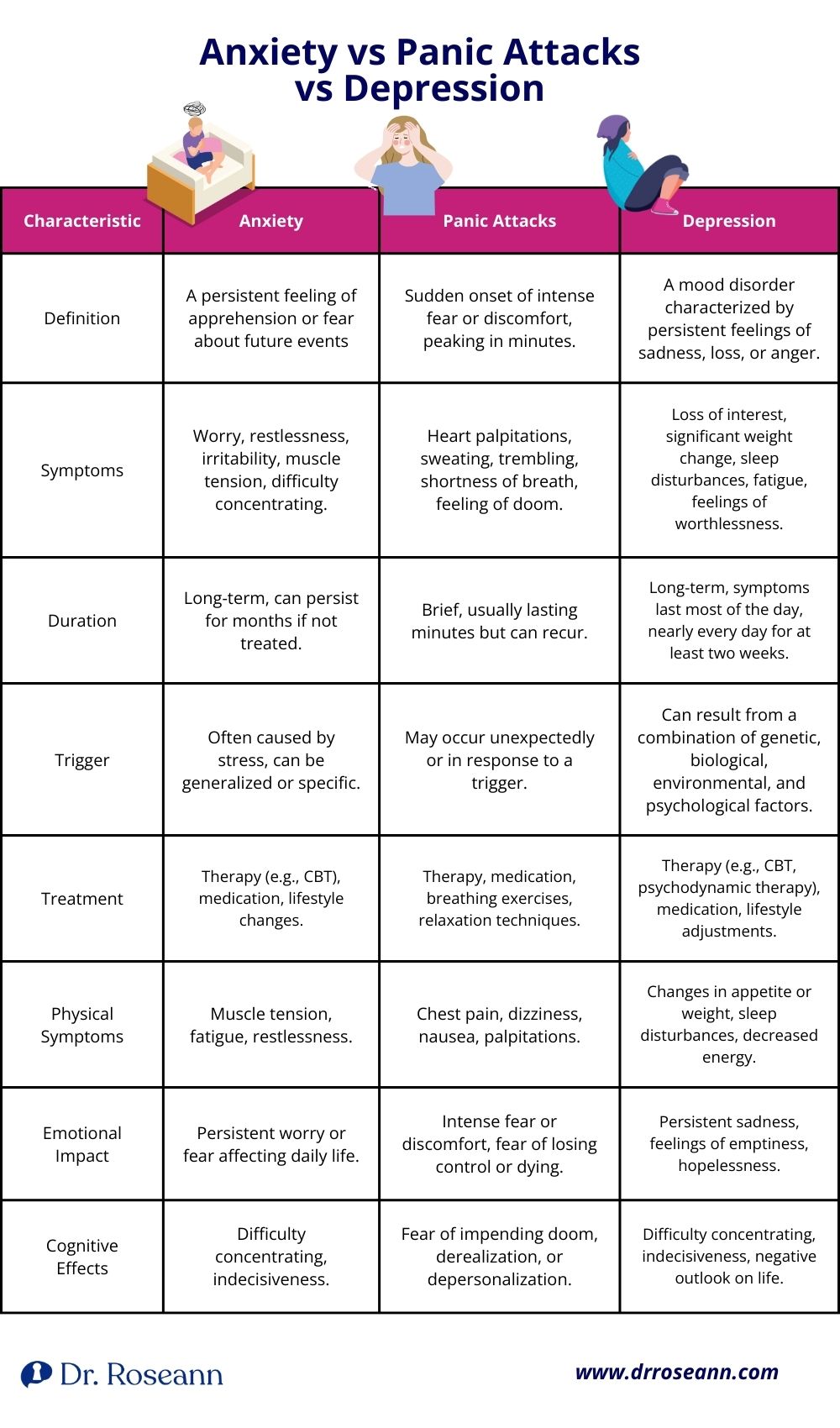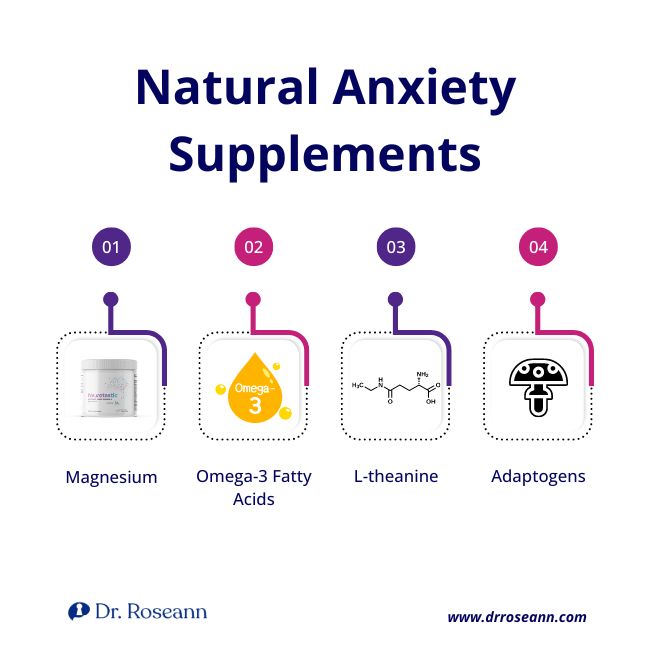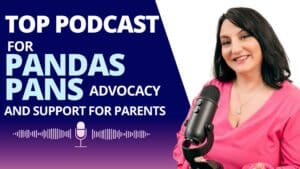There is something unpleasant about anxiety when it invades our minds. But can anxiety be treated without medication? Is there such a thing as natural care anxiety relief? To answer that, let's take a moment to understand anxiety.
Anxiety is more than just feeling a little worried or nervous. It is a spectrum of emotions ranging from mild unease to overwhelming panic. Whether it's caused by genetic factors, environmental stressors, or a combination of both, anxiety can affect anyone, including our little ones.
Children and teenagers with anxiety may experience a variety of symptoms. Excessive worrying, restlessness, trouble concentrating, headaches, and stomachaches are just a few examples.
Anxiety has a way of making its presence known. Remember the infamous panic attacks that trigger your heart rate to shoot up? How about those unwelcome surprises that leave you feeling like your heart is trying to escape your chest? Those are signs of anxiety.
Anxiety Attack vs Panic Attack
Anxiety attacks and panic attacks, while often combined together, present distinct experiences with unique characteristics. Anxiety attacks, driven by specific stressors, can endure for prolonged periods, extending even to days.
Individuals facing anxiety attacks encounter heightened worry alongside physical symptoms like rapid heartbeat and muscle tension, although typically milder compared to panic attacks. Coping strategies and relaxation techniques play a pivotal role in managing these episodes, emphasizing the importance of addressing underlying stressors.
Conversely, panic attacks emerge suddenly, often without discernible triggers, escalating rapidly to peak intensity within minutes. They overwhelm individuals with overwhelming fear, accompanied by pronounced physical sensations such as chest tightness and dizziness.
The sense of losing control or detachment from reality amplifies the distress, necessitating comprehensive therapeutic interventions which include therapy. However, we recommend the use of natural remedies for panic attacks instead of medications for kids.
Although distinct, anxiety attacks and panic attacks may intersect, complicating diagnosis and treatment. Seeking professional guidance is imperative for accurate evaluation and the development of tailored strategies for anxiety and panic attack treatment at home to navigate these challenging episodes effectively.
Conventional Anxiety Treatments and Their Limitations
Now, let's talk about the traditional approach to treating anxiety. The go-to option for many is medication, usually in the form of anti anxiety or antidepressant drugs. But while they seem helpful for some individuals, there's a catch—side effects!
Anti-anxiety medicines often have unpleasant surprises such as drowsiness, dizziness, headaches, and nausea. These can make you feel like you're trading one problem for another. But you don't have to rely solely on medication to treat anxiety.
Natural anxiety remedies can provide effective relief without the risk of these side effects. We'll focus on herbs, supplements, lifestyle changes, and relaxation that can be combined with therapies like CBT, PEMF, and neurofeedback.
But before that, let me share a story about a teen we'll call Linda. She was bright and imaginative, but she often found herself consumed by worry and anxiety. Her mind would race with anxious thoughts, and she would experience frequent panic attacks. It made her daily life challenging, as her anxiety seemed to take hold.
Linda's parents were concerned for her well-being, so they sought solutions to help her relieve her anxiety. They tried a lot of things to help with anxiety including medications, but the side effects proved to be too much for her. In their quest for alternatives, they discovered that it's possible to use natural treatment for anxiety.
Can Depression and Anxiety be Treated Without OTC Anxiety Meds?
Treating anxiety without using over the counter anxiety meds can provide effective relief minus the potential side effects of anti-anxiety drugs. Going for anxiety natural remedies allows you to avoid the laundry list of side effects that often come hand-in-hand with anti-anxiety medication. Instead, you'll have a clearer, more focused mind during treatment.
Moreover, using the best natural remedy for anxiety offers a more holistic approach to addressing anxiety. They consider the intricate connection between our physical and mental health conditions. Remember that supporting our physical well-being impacts our mental state positively.
Another incredible benefit of the natural ways to treat anxiety is the opportunity to develop skills and strategies that empower us to take control of our mental health issues. For instance, cognitive-behavioral therapy (CBT) equips us with tools to challenge unhelpful thoughts and behaviors that perpetuate anxiety. With the help of qualified mental health professionals, we can better understand our kid's anxiety and develop coping mechanisms tailored to their unique needs.
Furthermore, home remedy for anxiety is often a long-term, sustainable solution. While medication may provide short-term relief, it doesn't necessarily address the underlying causes of anxiety. Exploring natural remedies for anxiety and mind-body approaches allows us to make lifestyle changes that support our kid's overall well-being and equip them with effective strategies for the long haul.

Supplements as Natural Cures for Anxiety
Supplements can be a powerful ally in finding a helpful way to relieve anxiety without medication. These little wonders packed with nutrients and goodness can provide natural support for your mental and emotional well-being.
1. Magnesium
Magnesium is probably the strongest natural anxiety medication. It can reduce anxiety symptoms (Sartori et al., 2012). As a natural medicine for anxiety, this mighty mineral supports physical health and contributes to a calm, balanced mind. Incorporating magnesium-rich foods like spinach, almonds, and dark chocolate into your diet or taking magnesium supplements is one of the best natural anxiety relief.
2. Omega-3 Fatty Acids
Among the fish high in omega-3 fatty acids are salmon and mackerel. Flaxseed and walnuts are rich in this nutrient too. They have been shown to affect anxiety levels while supporting overall brain health positively. They also help regulate mood and reduce stress.
3. L-theanine
Green tea contains the amino acid L-theanine. This natural anxiety remedy has been found to promote relaxation, reduce anxiety, and even improve sleep quality. So, go ahead and sip on a cup of green tea or explore L-theanine supplements. It's like a calming breeze that gently carries your worries away.
4. Adaptogens
The adaptogens found in certain herbs, like ashwagandha and Rhodiola rosea, have been used for centuries in traditional medicine to support the body's response to stress. They help regulate cortisol levels, our stress hormone and promote a sense of calm.
Incorporating adaptogens into your daily routine through supplements or herbal teas can be a game-changer in your battle against anxiety. It's like having your stress-fighting squad.

Herbs and Other Home Remedies for Anxiety Attacks
Herbs are like nature's pharmacy source when finding a holistic treatment for anxiety. These calming agents offer a gentle yet effective anxiety treatment without medication. They soothe and calm the anxious mind and relieve anxiety. Here are some herbs that can help with anxiety treatment at home:
1. Lavender
For centuries, this herb has been cherished as a natural anxiety relief for its calming properties. Just a whiff of lavender essential oil can transport you to tranquility. Its soothing scent can remarkably ease anxious feelings while promoting relaxation. Put lavender essential oils in a diffuser or create a lavender-infused pillow for bedtime bliss.
2. Chamomile
Chamomile is a gentle flower brewed into a calming tea for generations. Chamomile tea can work wonders in soothing a restless mind and helping you drift off into dreamland. When used as among the herbs to treat anxiety, it works like a cozy blanket for your nervous system, gently wrapping you in calmness.
3. Peppermint
Peppermint, the invigorating herb we often associate with fresh breath, has a secret superpower—it can also help calm anxiety. Its cool and refreshing aroma can positively affect our mood, lifting us out of worry and stress. Peppermint tea is but a minty breath of fresh air for your anxious mind, making that the best home remedy for anxiety.
How to Get Rid of Anxiety Through Lifestyle Changes
In the battle against anxiety, lifestyle changes can be your secret weapon. Anxiety home remedies are all about creating an environment that promotes calmness and well-being. Encourage regular physical activity to help your child burn off excess energy and release feel-good endorphins. Whether playing outside, dancing like nobody's watching, or participating in sports, getting active can do wonders as these are effective natural remedies for anxiety attacks and depression.
Speaking of a calm environment, let's remember the power of a good night's sleep. Getting enough sleep is crucial for both mental and physical health. Establish a bedtime routine, create a cozy sleep sanctuary, and say goodbye to those sleepless nights filled with anxious thoughts.
How to Calm Anxiety with Effective Relaxation Techniques
Relaxation techniques are like magic spells that can banish anxiety and restore a sense of calm. Diaphragmatic breathing exercises activate the body's relaxation response and counteract the rapid shallow breaths that often accompany anxiety. Take slow, deep breaths with your child and watch the tension melt away.
Progressive muscle relaxation is another powerful technique that involves tensing and relaxing different muscle groups. It's like a mini workout for relaxation. Guided imagery, which creates calming mental images, can also transport your child to a peaceful oasis in their mind.
How to Reduce Anxiety Naturally
Naturally treating anxiety is a real possibility. With the help of traditional remedies, supplements, lifestyle changes, and relaxation techniques, you can support your child's brain health, enhance their mood, and reduce their anxiety levels. Here are some therapies to be included in your child's treatment plan:
1. Cognitive Behavioral Therapy
When anxiety tries to dim our inner light, cognitive behavioral therapy, or CBT, shines as a beacon of hope. This results-oriented therapy can cure nervousness naturally by reshaping negative thought patterns and behaviors that fuel anxiety disorders.
Working with a compassionate therapist or utilizing self-help resources helps children develop coping strategies. They also become more confident in challenging irrational beliefs and regaining control over their lives. CBT empowers us to embrace a brighter mindset and foster lasting relief from anxiety's grip.
2. Neurofeedback
Neurofeedback has shown effectiveness in treating various anxiety disorders, such as generalized anxiety disorder, panic disorder, and social anxiety disorder. As one of the most effective natural ways to help anxiety, it offers a non-invasive and drug-free treatment option that can be used alongside other therapeutic approaches, such as cognitive-behavioral therapy.
Studies have indicated the positive effects of neurofeedback on reducing anxiety levels and improving overall mental well-being (Micoulaud-Franchi et al., 2021). It targets specific brain regions and trains the brain to respond more adaptively. Neurofeedback empowers individuals to regain control over their anxiety, making it the best natural therapy for anxiety.
3. PEMF Therapy
In the quest for anxiety relief, the transformative power of Pulsed Electromagnetic Field (PEMF) therapy is steadily gaining recognition. This non-invasive treatment utilizes electromagnetic fields to invigorate cellular activity. Portable PEMFs are great home remedies for panic attacks.
Though primarily used for physical ailments, PEMF therapy has shown promise in alleviating anxiety symptoms (Pawluk, 2019). It modulates brainwave activity and induces deep relaxation. PEMF therapy also reduces stress hormones, calms the nervous system, and renews our sense of well-being.
Using a personalized approach, the BrainBehaviorResetTM Program addresses the root causes of anxiety and empowers individuals with effective strategies to reset their anxiety patterns.
As Linda embarked on her journey with the BrainBehaviorResetTM Program, she was welcomed into a warm and supportive environment. The program's experts recognized Linda's unique challenges and created a plan for treating anxiety naturally that’s right for her.
Linda learned various techniques and skills along with the natural ways to cure anxiety attacks. Through cognitive techniques, she gained the tools to challenge her negative thoughts and replace them with more positive and realistic ones. The mindfulness techniques she practiced helped her stay in the present moment and reduce the overwhelming feelings of worry.
Can anxiety be treated without medication? Yes, especially among children and teens. The BrainBehaviorResetTM program provides an effective and clear roadmap to the natural way to relieve anxiety fast.
Strategies for Managing Childhood Anxiety
Acknowledging the complexities of anxiety in children necessitates a thoughtful and informed approach, highlighting both the strengths and hurdles inherent in their situation. This understanding led to the creation of The Natural Anxiety Relief Kit. This resource is the result of comprehensive expertise gathered from working with numerous families, aimed at enlightening parents.
Crafted to provide dependable insights and clear methods, the kit aims to amplify the positive attributes of children dealing with anxiety and tackle their individual challenges effectively. Start supporting your child in a more empowered way by exploring The Natural Anxiety Relief Kit today.
What to take for anxiety?
Consider natural anxiety meds like herbal supplements such as valerian root or passionflower, which are known for their calming effects. Using natural medicine for anxiety disorder means no side effects.
How to calm anxiety at night naturally?
To calm anxiety at night naturally, try alternative treatments for anxiety like deep breathing exercises or meditation before bedtime. The use of herbal anxiety relief like chamomile tea or lavender essential oil can greatly help too.
What's good for anxiety attacks?
Holistic medicine for anxiety, including mindfulness practices, regular exercise, and a balanced diet, are natural ways to reduce anxiety. Using any natural cure for anxiety disorder promotes overall well-being.
How to treat anxiety naturally?
Explore holistic ways to treat anxiety such as acupuncture, yoga, or aromatherapy. Then combine it with home treatment for anxiety and depression like maintaining a healthy sleep schedule and reducing caffeine intake.
How to relieve anxiety naturally?
Incorporate natural anti anxiety remedies and relaxation techniques like progressive muscle relaxation or guided imagery into your daily routine. Don’t forget natural anxiety cures like herbal supplements such as lemon balm or ashwagandha for a taste of the best natural anxiety treatments.
What can help with anxiety?
All natural anxiety medicines, such as herbal supplements like kava, passionflower, or CBD oil can help alleviate anxiety symptoms. Additionally, lifestyle changes such as regular exercise, adequate sleep, and stress management techniques like meditation or yoga should also be part of your anti anxiety holistic treatment.
How can I cure anxiety naturally?
An effective anti anxiety natural remedy would be relaxation techniques such as deep breathing exercises, progressive muscle relaxation, and mindfulness meditation. Additionally, use natural meds for anxiety like valerian root, passionflower, or lavender. But the best complement of natural products for anxiety are lifestyle adjustments such as regular exercise, a balanced diet, and adequate sleep.
How to avoid anxiety naturally?
To experience natural relief for anxiety, prioritize self-care practices such as regular exercise, sufficient sleep, and a healthy diet. Natural remedies to cure anxiety and depression also incorporate stress-reducing activities like meditation, yoga, or spending time in nature. Other natural help for anxiety also includes herbal remedies like chamomile tea or supplements such as omega-3 fatty acids, which have been linked to mood stabilization.
How to stop anxiety nerve pain?
To alleviate anxiety-related nerve pain, holistic remedies for anxiety and depression such as acupuncture, chiropractic care, or massage therapy may provide relief. These techniques make anxiety treatments without medication a possibility. Other home anxiety treatments can help, such as promoting relaxation and reducing muscle tension.
Can social anxiety be cured naturally?
While social anxiety may not be entirely cured in the traditional sense, it is possible to ease anxiety naturally. Holistic anxiety medication can significantly alleviate symptoms and improve quality of life. Herbal remedies for panic attacks like passionflower or lemon balm may also offer relief from anxiety symptoms.
Citations
Micoulaud-Franchi, J. A., Jeunet, C., Pelissolo, A., & Ros, T. (2021). EEG Neurofeedback for Anxiety Disorders and Post-Traumatic Stress Disorders: A Blueprint for a Promising Brain-Based Therapy. Current Psychiatry Reports, 23(12). https://doi.org/10.1007/s11920-021-01299-9
Pawluk, W. (2019). Pulsed Magnetic Field Treatment of Anxiety, Panic and Post-Traumatic Stress Disorders. Journal of Alternative, Complementary & Integrative Medicine, 5(3), 1–8. https://doi.org/10.24966/acim-7562/100075
Sartori, S. B., Whittle, N., Hetzenauer, A., & Singewald, N. (2012). Magnesium deficiency induces anxiety and HPA axis dysregulation: Modulation by therapeutic drug treatment. Neuropharmacology, 62(1), 304–312. https://doi.org/10.1016/j.neuropharm.2011.07.027
Dr. Roseann is a mental health expert in Anxiety who frequently is in the media:
- Break the Rules Podcast Overcoming Anxiety & Mental Health Disorders.
- CBS2 New York (Article) Experts Offer Tips On How To Help Children Deal With Anxiety.
What if it's Not Depression (Video) Anxiety, OCD and Trichotillomania.
Always remember… “Calm Brain, Happy Family™”
Disclaimer: This article is not intended to give health advice and it is recommended to consult with a physician before beginning any new wellness regime. *The effectiveness of diagnosis and treatment vary by patient and condition. Dr. Roseann Capanna-Hodge, LLC does not guarantee certain results.
Are you looking for SOLUTIONS for your struggling child or teen?
Dr. Roseann and her team are all about science-backed solutions, so you are in the right place!
Grab your complimentary copy of
147 Therapist-Endorsed Self-Regulation Strategies for Children: A Practical Guide for Parents
There are 3 ways to work with Dr. Roseann:
You can get her books for parents and professionals, including: It’s Gonna Be OK™: Proven Ways to Improve Your Child’s Mental Health, Teletherapy Toolkit™ and Brain Under Attack: A Resource For Parents and Caregivers of Children With PANS, PANDAS, and Autoimmune Encephalopathy.
If you are a business or organization that needs proactive guidance to support employee mental health or an organization looking for a brand representative, check out Dr. Roseann’s media page and professional speaking page to see how we can work together.
Dr. Roseann is a Children’s Mental Health Expert and Licensed Therapist who has been featured in/on hundreds of media outlets including The Mel Robbins Show, CBS, NBC, PIX11 NYC, Today, FORBES, CNN, The New York Times, The Washington Post, Business Insider, Women’s Day, Healthline, CNET, Parade Magazine and PARENTS. FORBES called her, “A thought leader in children’s mental health.”

She coined the terms, “Re-entry panic syndrome” and “eco-anxiety” and is a frequent contributor to media on mental health.
Dr. Roseann Capanna-Hodge has three decades of experience in working with children, teens and their families with attention-deficit hyperactivity disorder (ADHD), autism, concussion, dyslexia and learning disability, anxiety, Obsessive Compulsive Disorder (OCD), depression and mood disorder, Lyme Disease, and PANS/PANDAS using science-backed natural mental health solutions such as supplements, magnesium, nutrition, QEEG Brain maps, neurofeedback, PEMF, psychotherapy and other non-medication approaches.
She is the author of three bestselling books, It’s Gonna Be OK!: Proven Ways to Improve Your Child's Mental Health, The Teletherapy Toolkit, and Brain Under Attack. Dr. Roseann is known for offering a message of hope through science-endorsed methods that promote a calm brain.
Her trademarked BrainBehaviorResetⓇ Program and It’s Gonna be OK!Ⓡ Podcast has been a cornerstone for thousands of parents facing mental health, behavioral or neurodevelopmental challenges.
She is the founder and director of The Global Institute of Children’s Mental Health, Neurotastic™Brain Formulas and Dr. Roseann Capanna-Hodge, LLC. Dr. Roseann is a Board Certified Neurofeedback (BCN) Practitioner, a Board Member of the Northeast Region Biofeedback Society (NRBS), Certified Integrative Mental Health Professional (CIMHP) and an Amen Clinic Certified Brain Health Coach. She is also a member of The International Lyme Disease and Associated Disease Society (ILADS), The American Psychological Association (APA), Anxiety and Depression Association of America (ADAA) National Association of School Psychologists (NASP), International OCD Foundation (IOCDF).
© Roseann-Capanna-Hodge, LLC 2024
Disclaimer: This article is not intended to give health advice and it is recommended to consult with a physician before beginning any new wellness regime. *The effectiveness of diagnosis and treatment vary by patient and condition. Dr. Roseann Capanna-Hodge, LLC does not guarantee certain results.













